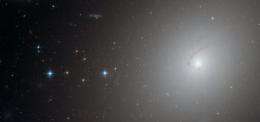NGC 4696: A cosmic question mark

This picture, taken by Hubble's Advanced Camera for Surveys, is not just a beautiful snapshot of NGC 4696, the largest galaxy in the Centaurus Cluster (galaxy cluster Abell 3526). It is also an illustration of the rich variety of objects that astronomers can see with the NASA/ESA Hubble Space Telescope.
NGC 4696 is an elliptical galaxy with a difference. Lacking the complex structure and active star formation of their spiral brethren, elliptical galaxies are usually little more than shapeless collections of ageing stars.
Most likely formed by collisions between spiral galaxies, elliptical galaxies experience a brief burst of star formation triggered as the interstellar dust and gas crash into each other, but which quickly leaves the young elliptical galaxies exhausted. With no more gas to form new stars from, the galaxies gradually grow older and fainter.
But NGC 4696 is more interesting than most elliptical galaxies.
The huge dust lane, around 30 000 light-years across, that sweeps across the face of the galaxy is one way in which it looks different from most other elliptical galaxies. Viewed at certain wavelengths, strange thin filaments of ionised hydrogen are visible within it. In this picture, these structures are visible as a subtle marbling effect across the galaxy's bright centre.
Looking at NGC 4696 in the optical and near-infrared wavelengths seen by Hubble gives a beautiful and dramatic view of the galaxy. But in fact, much of its inner turmoil is still hidden from view in this picture. At the heart of the galaxy, a supermassive black hole is blowing out jets of matter at nearly the speed of light. When looked at in X-ray wavelengths, such as those visible from NASA's Chandra X-ray Observatory, huge voids within the galaxy become visible, telltale signs of these jets' enormous power.
The picture was created from images taken using the NASA/ESA Hubble Space Telescope's Advanced Camera for Surveys. A total of 5440 s of exposure through a blue filter (F435W, shown in blue) were combined with 2320 s through a near-infrared filter (F814W, shown in red).The field of view is 3.2 by 1.5 arcminutes.
Provided by ESA/Hubble Information Centre




















